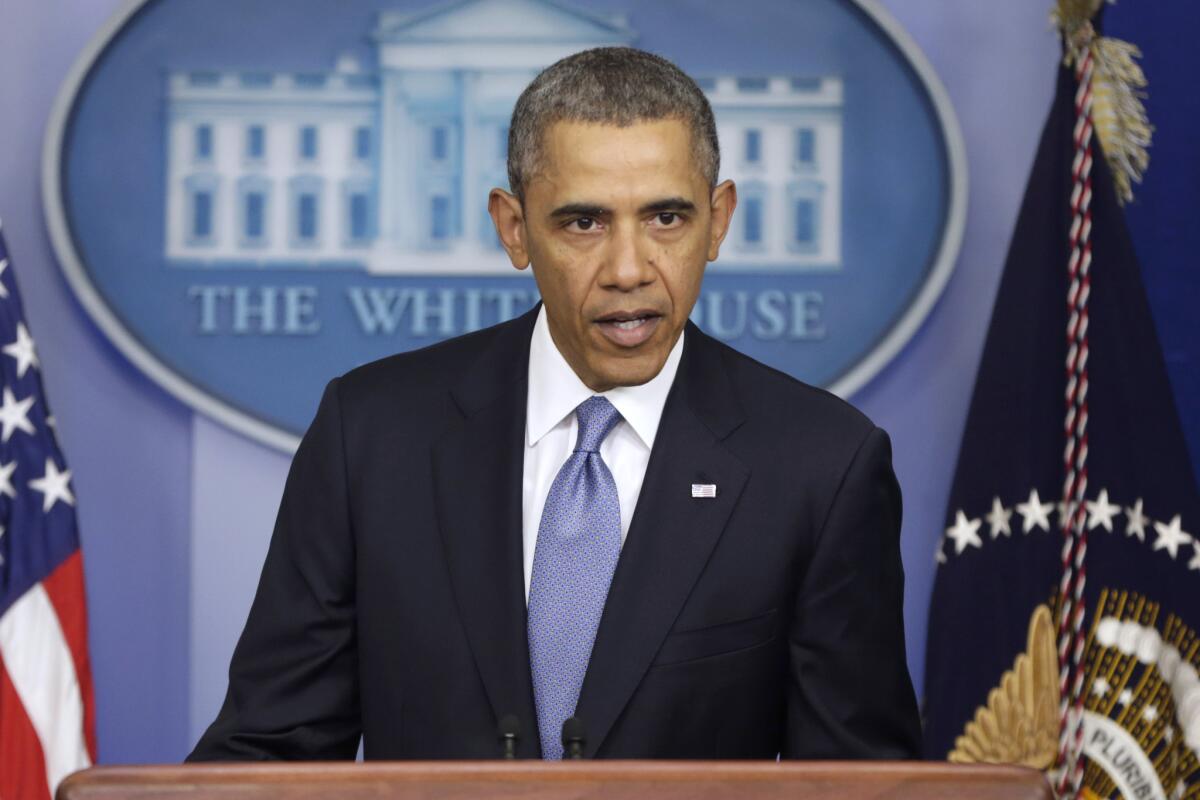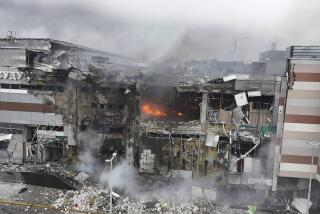U.S. must be ready to impose additional sanctions on Russia

When he announced sanctions against key Russian officials on Monday morning, President Obama indicated that he would take even harsher measures in the days ahead if Russia continued to undermine the independence and territorial integrity of Ukraine.
We hope he was serious about that. Within hours of Obama’s remarks, Russian President Vladimir Putin recognized the Ukrainian republic of Crimea as a “sovereign and independent state.” Meanwhile, authorities in Crimea were moving to implement Sunday’s referendum in which 96% of voters supposedly supported reunion with Russia.
It is important that the U.S. and other nations not accept the conquest of Crimea as a fait accompli. Russia’s aggression in Ukraine represents a dangerous flouting of international law that justifies severe reprisals — including, if necessary, a rupture in trade and other economic relationships with the West on which Russia has become increasingly reliant.
Last week German Chancellor Angela Merkel, widely regarded as more conciliatory toward Moscow than other Western leaders, warned that Russia faced “massive” economic and political damage if it didn’t agree to negotiations on the status of Ukraine. The European Union, which also has imposed sanctions on several Russian officials, should be prepared to join the U.S. in ratcheting up sanctions if Russia continues its actions against Ukraine.
Resistance to such aggression is not, as Obama has emphasized, a move in “some Cold War chessboard in which we’re in competition with Russia.” Nor is it a refusal to recognize Russia’s interests in Crimea. Those interests are legitimate and long-standing. Crimea was part of the Russian Federation until 1954, when it became an autonomous republic within the Soviet Union.
But in mobilizing Russian troops in Crimea, Putin violated solemn promises to respect Ukraine’s territorial integrity. He also guaranteed that Sunday’s hastily arranged referendum on reuniting Crimea with Russia would lack international legitimacy. It was only a Russian veto that prevented the United Nations Security Council on Saturday from condemning the referendum in advance as having “no validity.” Significantly, China, which has supported Russia on other issues, abstained.
It may be that a majority of the inhabitants of Crimea sincerely desire to be ruled by Russia. But no one can take seriously a referendum that was conducted under the guns of foreign troops and offered voters only two choices: reunion with Russia or virtual independence under the terms of a short-lived constitution adopted after the collapse of the Soviet Union. Voters weren’t given the option of endorsing Crimea’s current political status.
There also are signs that Russia has designs on other regions in Ukraine, especially in the eastern parts of the country. Over the weekend Ukrainian officials reported that Russian troops had seized control of a natural gas distribution station in a region bordering Crimea. The pretext offered for invading Crimea — that Russia was protecting Russian-speaking people threatened by violent Ukrainian nationalists — could easily be extended to justify military action in other parts of the country. Obama seemed to be referring to that possibility Monday when he warned Russia against “further provocations.”
Even as he was announcing new sanctions against Russian officials, Obama said that he believed that “there’s still a path to resolve this situation diplomatically in a way that addresses the interests of both Russia and Ukraine.” He called for Russia to pull back its forces in Crimea to their bases, accept the deployment of international observers in Ukraine and open a dialogue with Ukrainian officials about constitutional reforms that could ensure significant autonomy for Crimea. It is even possible — though Obama didn’t mention this scenario — that Crimea could strengthen its ties to Russia without seceding from Ukraine.
So far, to put it mildly, Putin seems disinclined to compromise on Crimea. On Tuesday he will address the Russian parliament about the situation in Crimea. If he proposes a speedy annexation of that territory, the U.S. and other nations that have denounced Russia’s aggression must be prepared to impose additional sanctions. Otherwise their condemnations of Russia for violating international law will ring embarrassingly hollow.
More to Read
A cure for the common opinion
Get thought-provoking perspectives with our weekly newsletter.
You may occasionally receive promotional content from the Los Angeles Times.






